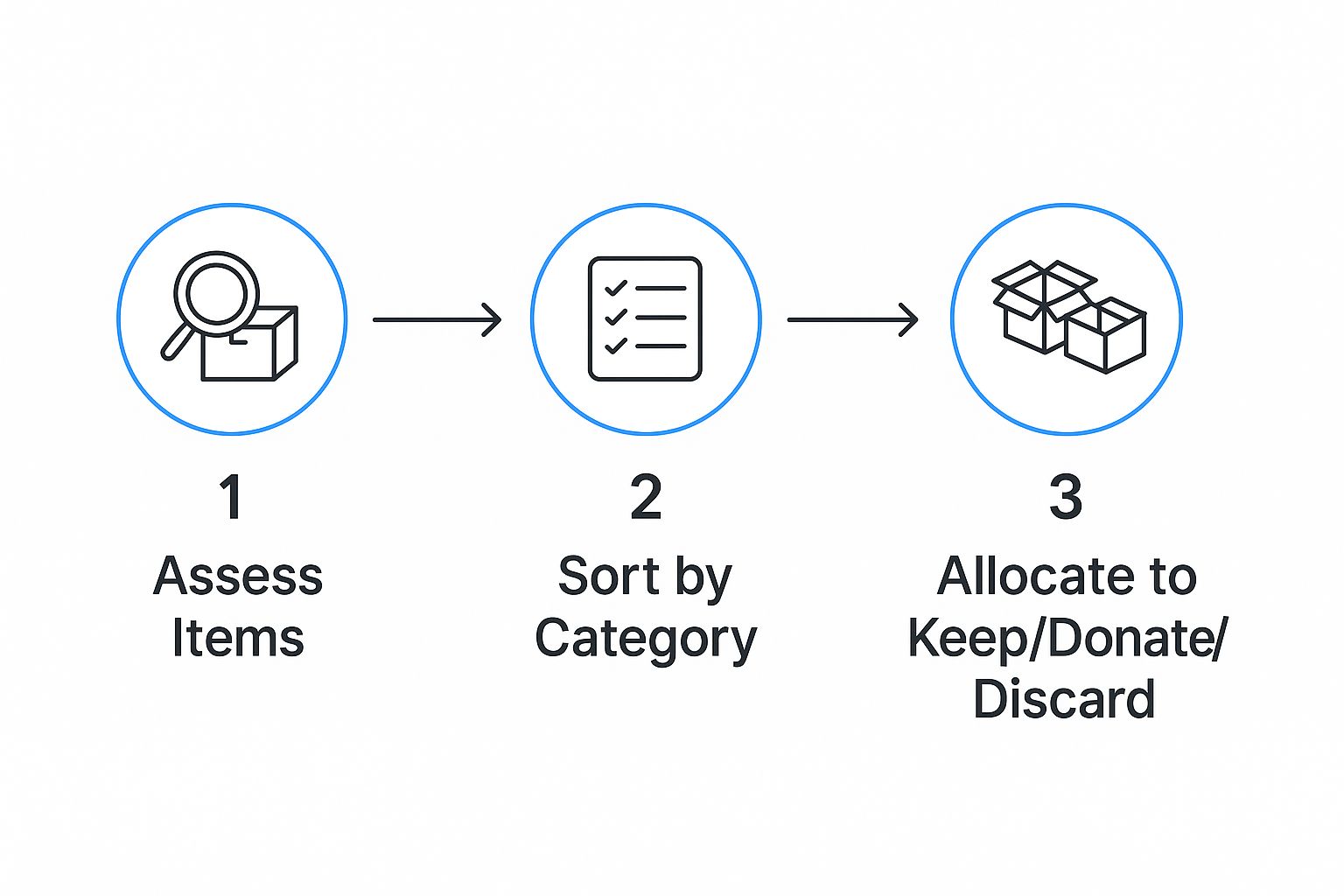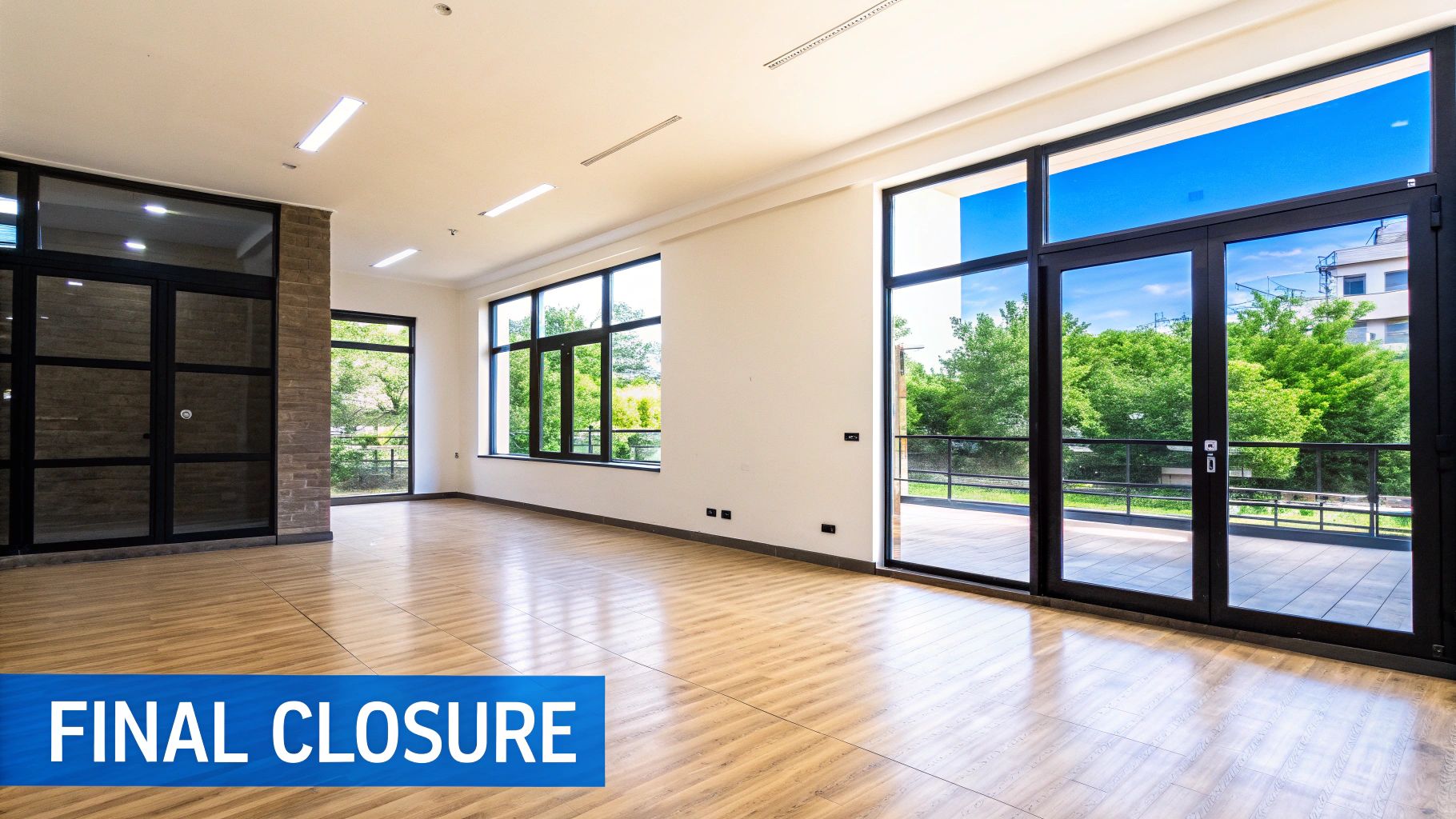Cleaning Out House After Death: A Compassionate Guide

When you’re facing a loved one’s home after they’ve passed, the task ahead feels monumental. The quiet rooms, filled with memories, can be overwhelming. It’s completely normal to feel an urgent need to do something—to start sorting, clearing, and making progress.
But the most critical first step in cleaning out a house after a death has nothing to do with boxes or trash bags. It’s about taking a moment to breathe and handling the foundational work first. Before you touch a single item, you need to create stability in what feels like a chaotic time.
First Things First: Secure the Property and Find the Paperwork
Your immediate priority is to secure the house itself. This means walking the property and making sure every single door and window is locked up tight.
If caregivers, neighbors, or friends had keys, it's a smart move to change the locks. This isn't about mistrusting anyone; it's a simple, practical step to protect the estate from any potential loss or liability down the road. You're creating a secure starting point.
At the same time, you need to begin the hunt for the most important documents: the will or trust. These legal papers are the roadmap for everything that comes next. They name the executor or trustee—the one person who has the legal authority to manage the deceased's assets, including everything inside the home.
Without that legal designation, you could be overstepping your bounds. For instance, you can't legally sell or even donate items until the estate settlement process is officially underway and the executor has been confirmed by the court. It’s a frustrating but necessary waiting game.
A Critical Note on Grief and Timing: Please, give yourself and your family permission to grieve. The pressure to "get it done" is immense, but rushing into the physical labor can short-circuit the emotional processing that has to happen. Taking a week or two to just be with family, share stories, and support each other isn't a delay—it's a vital part of this journey.
Immediate Action Checklist
Before you start sorting, there are a few non-negotiable tasks to tick off. This checklist covers the absolute first things you should do to ensure the process is handled legally and securely from the very beginning.
| Action Item | Why It Matters |
|---|---|
| Secure All Entry Points | Change the locks if necessary to prevent unauthorized access and protect the estate’s assets. |
| Locate the Will or Trust | This document identifies the legal executor or trustee, the only person authorized to act. |
| Contact the Estate Attorney | The attorney will guide the executor through the legal process of settling the estate. |
| Forward the Mail | Prevents mail pile-up, which signals an empty house, and ensures important bills and statements are received. |
| Notify Utility Companies | Keep utilities on to maintain the home, but ensure accounts are properly managed. |
| Document the Home’s Condition | Take photos of each room to have a baseline record before any items are moved or removed. |
Completing these steps creates the stable foundation you need to move forward with the cleanout in a way that is organized, respectful, and legally sound.
A Gentle Walk-Through, Not a Mad Dash
Once you have the legal green light, resist the temptation to immediately call for a dumpster. The first real "action" inside the home should be gentle. Grab a notepad, not trash bags, and just walk through the house.
This isn't about making decisions yet. It's about assessment. As you move from room to room, you’re simply taking inventory of the situation.
- Look for obviously sentimental items that you know a specific family member might want. Jot them down.
- Keep an eye out for other key documents. Things like life insurance policies, bank statements, social security papers, or vehicle titles often get tucked away in unexpected places.
- Snap photos of every room. This creates a visual record of the home's contents before you begin, which can be invaluable later.
Starting slowly and methodically helps dial down that overwhelming feeling. It shifts the process from a frantic purge into what it should be: a respectful and organized farewell. By putting legalities and your family’s emotional well-being first, you set a compassionate tone for the challenging work ahead.
Building a Realistic and Respectful Plan

When you're facing a house full of memories, the sheer scale of the task can feel paralyzing. Your best defense against that overwhelm is a thoughtful plan. This isn't just about making a to-do list; it's about creating a framework that respects both the work involved and the emotional weight you're carrying.
Start by setting a timeline that actually works for you and your family. It’s tempting to rush, but an aggressive deadline that ignores the need for grief and rest will only lead to burnout. Many people find a project-based timeline works far better. Instead of saying, “We’ll clear the house in two weeks,” try aiming to tackle one specific room per weekend. This approach honors your emotional capacity and prevents the job from taking over your life.
Setting a Gentle Pace with a Room-by-Room Strategy
One of the best ways I've seen families build momentum is by starting with the least personal areas of the home. This gives you a chance to get into a rhythm of sorting and decision-making before you have to handle the more emotionally charged spaces.
Here’s a progression that works well:
- Start Here (Low Emotional Impact): Begin with the kitchen, laundry room, or office. These areas are mostly filled with functional items that are easier to sort without triggering a flood of intense memories.
- Move On To (Medium Emotional Impact): Next, work your way into shared living spaces like the living room or dining room. While these rooms hold family memories, they feel less intimate than personal quarters.
- Finish Here (High Emotional Impact): The master bedroom, personal closets, and any dedicated hobby rooms should be last. These spaces are often the most difficult and require the most emotional energy, so it’s best to face them once you’ve found your groove.
Think of it as a gentle warm-up. This strategy prepares you for the harder work ahead, making the entire process feel more manageable.
Communicating and Collaborating with Family
Family dynamics can make or break this process. It's amazing how quickly miscommunication can lead to hurt feelings or conflict right when you need support the most. The solution? Hold a family meeting before anyone starts sorting.
Use this meeting to lay out the room-by-room plan and get everyone's input. The goal is to divide labor based on who feels most capable of handling certain tasks. You might find one sibling is fantastic at organizing paperwork, while another is happy to sort through the tools in the garage.
Establish a clear, agreed-upon method for handling sentimental items. You could use a rotating selection process or have each family member create a "wish list" of items they'd love to have, then calmly discuss any overlaps.
This kind of collaboration isn't just about being efficient; it's about sharing the emotional load. By creating a transparent plan and keeping the lines of communication open, you can transform a potentially divisive task into a shared act of remembrance and healing. It makes the journey of cleaning out the house a more respectful and connecting experience for everyone involved.
Sorting Belongings with the Four-Box Method
Once you have a game plan, it's time to start the physical work of sorting. Honestly, this is often the most emotionally taxing part of the whole process. To keep from getting overwhelmed, we swear by the Four-Box Method. It's a simple, systematic approach that helps cut down on decision fatigue and brings a little order to the chaos.
The idea is really straightforward. As you work through a room, every single item you touch goes into one of four boxes or designated areas:
- Keep: These are the items that you or other family members will cherish. Think heirlooms, photos, and personal keepsakes that mean something special.
- Sell: This box is for items that have monetary value. It could be anything from antique furniture and fine china to collectibles, tools, or artwork.
- Donate: This is for all the useful stuff that’s in good shape but no one in the family needs. Clothes, functional kitchen gadgets, books, and furniture all fit here.
- Dispose: Everything else goes here. Broken items, expired food, old paperwork, and general junk.
This simple system forces you to make a decision and move on, which is critical when you're facing a whole house full of possessions.

Having a visual reminder like this can really help reinforce the process and keep you on track when things feel tough.
Navigating the Keep and Sell Piles
Deciding what to keep can be a minefield of emotions. To keep family squabbles to a minimum, set some ground rules before you even start. You could have everyone make a "wish list" or use colored dot stickers to claim items. If a few people want the same high-value piece, you can take turns choosing or simply draw straws. The key is to agree on a fair system first.
The "Sell" box is where things get a bit more interesting. Just because something is old doesn't mean it's valuable. Look for real signs of quality—maker's marks on pottery, signatures on paintings, or solid wood construction on furniture. If you get a gut feeling something might be worth real money, set it aside to get it appraised later. Don't get bogged down trying to price things on the fly. Your only job right now is to sort.
The Swedish concept of döstädning, or “death cleaning,” was made popular by Margareta Magnusson. It’s the practice of decluttering your own life so your family doesn't have to. Thinking this way can help you focus on what truly matters, both sentimentally and financially.
Handling Donations and Disposals
You’ll be surprised at how fast the "Donate" pile grows. Before you start loading up the car, it’s a good idea to check the donation guidelines for local charities. Some organizations have very specific needs, while others won't take certain things like older TVs or large appliances. A quick phone call can save you a wasted trip.
For the "Dispose" category, do yourself a favor and consider renting a small dumpster. It's almost always more efficient than making a dozen trips to the local dump. The sheer volume of stuff from a full cleanout is usually more than your weekly trash bins can handle. There's a reason the global cleaning services market was valued at around $415.93 billion in 2024—estate cleanouts are a huge part of it. You can learn more about current cleaning industry trends on GetJobber.com.
By sticking to this four-box system, you can turn what feels like an impossible mountain of stuff into manageable groups. It allows you to move through the process with purpose and treat your loved one's belongings with the respect they deserve.
From Piles to Plans: Selling, Donating, and Disposing

You’ve done the hard emotional work of sorting. Now, those neat piles represent the next phase of the project, which requires a shift in mindset from sentimental to logistical. The “Sell” pile, in particular, is about to become a small business venture.
When it comes to valuable items—whether it's jewelry, a collection of fine art, or that antique sideboard—you need a careful, measured approach. It's almost always a mistake to guess at an item's worth. I strongly advise getting a professional appraisal for anything you suspect has significant value. A certified appraiser provides an official valuation that is crucial not only for getting a fair price but also for any estate tax purposes. Their trained eye can spot details a quick online search will miss, which can make all the difference in an item’s true market value.
Your Options for Selling Estate Items
Once you have a ballpark figure for your valuables, it’s time to figure out the best way to sell them. The right path really depends on what you have and how much of it there is.
- Traditional Estate Sale Company: Bringing in a company to run an in-person sale right in the home is a classic choice for liquidating a large volume of general household goods. The downside? Their commissions are steep, often taking 30% to 50% of the gross sales.
- Consignment Shops: If you only have a few high-quality pieces, like furniture or artwork, a local consignment store could be a decent option. They do all the selling for you, but again, they'll take a significant cut from the final price.
- Online Auctions: A modern, more profitable alternative is to run your own online estate sale. Platforms designed for this give you full control over pricing and timing while reaching a huge audience of motivated local buyers. This approach almost always puts more money back in your pocket.
Taking a moment to understand what estate liquidation is and exploring the different models available is a smart first move. It equips you to choose the best option for your family's specific financial goals and timeline.
Here's an important reality check: you don’t have to sell every single thing. The main goal is to respectfully clear the property. If selling a particular item is going to be more trouble than it's worth, it's perfectly fine to move it to the donation pile.
Handling Donations and the Final Cleanup
For everything in the "Donate" pile, a little targeted research pays off. Many local animal shelters, community theaters, or transitional housing charities have very specific needs. A quick phone call to see what they're looking for helps ensure your loved one's belongings can make a real difference. Many will even schedule a pickup for larger furniture items, which is a huge help.
And finally, you're left with the "Dispose" pile. It's almost always bigger than you think it will be. Renting a small dumpster is often the most efficient way to handle all the non-hazardous trash. For things like old paint, cleaning chemicals, or outdated electronics, you’ll need to check your local city or county's website for their hazardous waste disposal guidelines and locations. These items can't just be tossed in the trash or a dumpster.
The Final Clean and Preparing the Property
Once the last box is gone, the house feels incredibly empty. You might think you're done, but there’s one critical step left: the final deep clean. This isn't your average weekly tidying up. This is a complete reset for the property, a top-to-bottom scrub down that gets it ready for its next chapter, whether that's putting it on the market, renting it out, or handing the keys to another family member.
The real goal here is to erase the signs of the past so a potential buyer or new resident can see the home's potential, not its history. It's about tackling the grime and dust that accumulate in all the overlooked places.
Your Deep-Cleaning Checklist
Think of this as restoring the house itself. You’ll want to be methodical, always working from the top down in each room so you aren't knocking dust onto surfaces you just cleaned.
- Walls and Ceilings: Start by dusting all the walls, ceilings, and clearing out corner cobwebs. A magic eraser or a mild cleaning solution can work wonders on scuffs and fingerprints, especially around light switches.
- Fixtures and Vents: Wipe down every light fixture, ceiling fan blade, and HVAC vent cover. These are notorious dust magnets that are easy to miss but make a huge difference.
- Windows and Treatments: Clean windows inside and out until they sparkle. Don't forget the tracks and sills, and be sure to wash or dust the blinds and curtains.
- Deep Kitchen Clean: This is a big one. You need to scrub all appliances, inside and out. That means the oven, the microwave, and the refrigerator. Degrease the stovetop and vent hood, then wipe out every cabinet and drawer.
- Bathroom Sanitization: Sanitize everything. Toilets, showers, tubs, sinks, and countertops all need a thorough scrubbing. Pay extra attention to cleaning tile grout and making sure all drains are clear.
This final, meticulous clean is really the last act of care for the home. It creates that all-important blank slate.
Knowing When to Call for Professional Help
Let's be honest—sometimes, the job is just too big. After the emotional and physical marathon of clearing an estate, the thought of spending days on your hands and knees scrubbing can feel completely overwhelming.
This is the point where hiring a professional cleaning service isn't a luxury; it's a smart, strategic decision. It saves you time, energy, and ensures the job is done to a professional standard. For more insight, you can explore what professional estate cleanout services typically cover.
It's crucial to know the difference between a standard maid service and a specialized biohazard cleanup crew. If the death occurred in the home and was undiscovered for any length of time, you must hire a certified biohazard remediation company. They are the only ones with the proper training, equipment, and protocols to handle this sensitive situation safely and completely.
There's a reason the professional cleaning industry is so large. In 2020, U.S. cleaning services were valued at a massive $55.7 billion and are projected to keep growing. Bringing in the pros can give you priceless peace of mind and a definitive sense of closure, knowing the home is truly ready for what comes next.
Common Questions About Estate Cleanouts

When you're facing an estate cleanout, it feels like a thousand questions pop into your head all at once, and many of them are tough to even ask. Let's tackle some of the most common ones head-on. My goal here is to give you the straightforward, practical answers you need to navigate this difficult process.
How Long Does a House Cleanout Take?
This is usually the first question people ask, and the honest answer is: it really depends. There's no magic number. A small apartment might be manageable over a long weekend, but a large family home filled with decades of belongings could easily take weeks, or even months.
The biggest factors are the size of the house, how much stuff is inside, and how many people are helping. The most important advice I can give is to be realistic. Pushing too hard, too fast, only leads to burnout for you and everyone involved.
Who Is Legally Allowed to Clean Out the House?
This is a big one, and getting it wrong can cause major problems. Legally, only the executor of the will or the trustee of the trust has the authority to go through and dispose of the deceased's property.
If you start selling, donating, or even just clearing things out before that person is officially appointed by the court, you could find yourself in serious legal trouble.
Even if you are the named executor, you still have to follow the proper legal steps. Using a comprehensive executor duties checklist is a great way to make sure you're doing everything by the book.
What If We Find Cash or Valuables?
It happens more often than you'd think—a stash of cash tucked in a book, or forgotten jewelry in a drawer. It's critical that you handle these finds correctly.
Any cash you discover must be documented immediately and deposited directly into the estate's bank account. This is a special account set up by the executor to handle all the estate's finances. Other valuables, like art or antiques, are considered assets of the estate. They need to be professionally appraised to establish their fair market value before they can be sold or given to heirs as outlined in the will.
Key Takeaway: Transparency is everything. The executor must formally log every financial discovery to ensure all beneficiaries receive their fair and legal share of the estate. No exceptions.
Can I Hire Someone to Do Everything?
Yes, you absolutely can, and for many people, it's a lifesaver. Full-service estate cleanout companies can handle the entire project from start to finish. They’ll sort, pack, haul away junk, and even do the final deep clean.
Hiring pros is an especially good option if you live far away, are short on time, or just feel too emotionally overwhelmed to tackle it yourself. These companies have gotten very good at what they do. In fact, one recent report noted that 42% of cleaning companies are working to improve their operational efficiency, and 32% are adopting new software to better manage huge jobs like estate cleanouts. This focus on professionalism means you get a more reliable and streamlined service when you need it most.